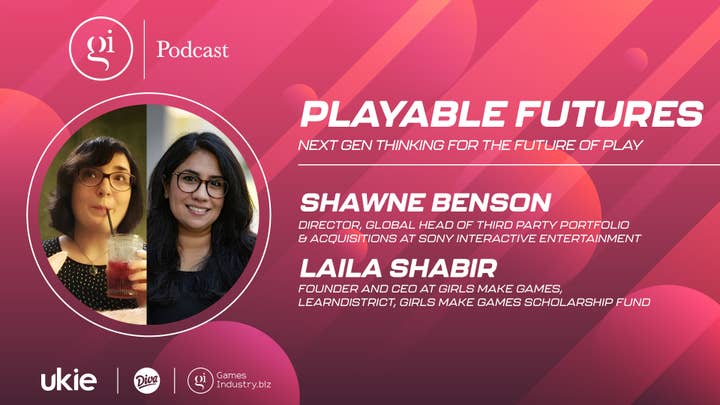The future of females in video games|Playable Futures Podcast
Sony’s Shawne Benson and Girls Make Games’ Laila Shabir join us for the next installment of our Playable Futures series.

Sign up for the GI Daily and have the day’s top stories sent straight to your inbox.
In this latest episode of our Playable Futures Series, Will Freeman talks to Shawne Benson, Global Head of Third Party Portfolio & & Acquisitions at Sony Interactive Entertainment, and Laila Shabirm, Founder & & CEO of Girls Make Games.
In this, our eighth adventure, we take on a topic that has been, and will continue to be, a hot topic in the industry: women in video games. This informative conversation explores the ways in which the market has changed to include more diverse voices and the future benefits of doing so, focusing on a field that is commonly associated with harmful gender stereotypes.
The podcast gamer has included a summary of the episode below.
The Playable Futures Podcast is a companion to Playable Futures, a compilation of essays, interviews, and short pieces by international luminaries in the video game industry on the future of the market and the medium. GamesIndustry.biz has published ten short articles so far, with more on the way. The work on Playable Futures was a team effort involving GI.biz, UKIE, and Diva.
In addition to our own RSS feed, you can listen to the GamesIndustry.biz Podcast on popular podcasting services like Spotify, iTunes, Google Play, Stitcher, Overcast, Player FM, and TuneIn. This episode is also available for direct download.
Composed by Thomas Marchant for the title. Keira Freeman produced this episode.
I think it’s fairly obvious that if we have more women doing something, everyone benefits,” Laila says. From a business standpoint, more game creators means more players. That makes sense, in a way… It’s important to consider how these builders will increase our sway.
“We didn’t think computer games were for us when they first came out.”
Sony’s Shawne Benson
Earlier generations didn’t feel like video games were for us, Shawne adds. “What I like about where we’re going is that we’ll be able to give more developers with different perspectives more influence. Life imitates art? And if we’re just mimicking through our really distinct, narrow perspective, it’s going to be really hard for people to have a wider point of view, and it’s also going to be hard for us to bring in new audiences to come play our games and make it seem like a welcome area for them.
Neither Laila nor Shawne, as they both admit, has taken a “traditional” or “direct” route into the market. Both women came from gaming families and shared a love for the medium, but neither ever expected to work in the industry because of their gender.
I always thought I’d make it as a professional artist. Shawne says, “I really thought I was going to be a theatre artist.” I didn’t go in that direction, but it still led me to an awesome spot. Don’t ignore your gut, the places you’re hoping and the things that excite you.
Benson’s current role at Sony Interactive Entertainment has her and her team coordinating material strategy, forming partnerships with other studios, and advocating for the inclusion of third-party content. She will gain unique perspective into the inner workings of the market as a whole and how diversity has actually improved its offering thanks to her new position.
“I think about it from a business perspective: how can we cultivate a more thriving community of content that looks to have a little something for everyone, and embrace different ways to play? Amazing progress is being made by a wide range of creators, the likes of which I would never expect to see from the traditionally male-dominated AAA industry.
Laila feels strongly that age and gender shouldn’t be a limiting factor when it comes to encouraging women to pursue their passions and turning them into a successful career. Laila and her team provide both in-person and online summer camps through Girls Make Games, inspiring young women (as young as eight) to get into game design and development.
For women to succeed in the workplace, they must project an image of competence, opportunity, and assurance.
Girls Can Make Games, Laila Shabir
“From where I sit, and based on the work that we’ve done, it’s incredibly important to me to see women themselves appear to have the knowledge, opportunity, and self-confidence to pursue a career that they desire.”
Both believe that a bright, dynamic, and, most importantly, diverse future for video games can be guaranteed by accepting people from different backgrounds and encouraging them to contribute their vision and experiences.
When Laila says, “the world requires to hear your concepts,” she means it. “A lot of the time you think, ‘It’s just a notion that I’m interested in,’ and that’s OK. I mean, who the hell wants to play this? How often do we usually do that? Your ideas matter, and the rest of the world needs to hear them.
Shawne agrees, noting that major studios weren’t always open to telling introspective, personal stories, but that indie developers from various walks of life are now helping to reshape the industry’s outlook.
“You start to see these leaders of little developers from all walks of life creating fresh tales that are slowly but surely making their way into the larger broad customer media. Having more of that would be great. I think it will be crucial in the future to have the right people in the right places working on the home entertainment pipeline.
Sign up for the GI Daily and have the day’s top stories sent straight to your inbox.

























